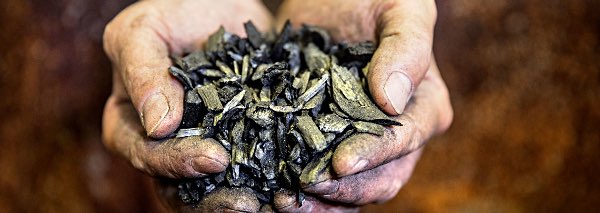- By Cornell University
- Around Town
 Print
Print 
Cornell University scientists will explore turning trash into treasure as Cornell's new pyrolysis kiln – the largest research kiln of its kind at a U.S. university – will help scientists explore the potential for carbon-negative energy production, producing new biomaterials and creating Earth-friendly biochar.
Biochar is a solid, charcoal-like material formed by heating biomass in the absence of oxygen in a process known as pyrolysis.
The pyrolysis kiln officially opens May 24, when Johannes Lehmann, professor of soil science, will hold an open house 2-4 p.m., at the Leland Laboratory building, at Medicago Drive near Caldwell Road on Cornell's Ithaca campus.
"This is an opportunity to work with industry or municipalities that have a waste issue and find out if slow pyrolysis is a good option for them," said Lehmann, a fellow at Cornell's Atkinson Center for a Sustainable Future. "Importantly, we want to let the world know – for academic, governmental or business entities – that we're here, open and ready for research."
Though not a fertilizer, biochar – when applied to soil – boosts fertility by helping to retain water in the soil when it is dry, promote drainage when conditions are wet and retain soil nutrients.
The new research kiln can transform over 100 pounds of waste an hour, and it is agile enough to allow rapid testing of different inputs and production conditions.
"Pyrolysis technology and our unparalleled capacity to convert trash into treasure is an opportunity for businesses, farmers or municipalities to reduce their environmental footprint and create new value," Lehmann said. "We're here to tap into what businesses or local governments may not have thought about. For most industries, this is a completely new way of dealing with waste."
The kiln represents a new model for creating a green future. "With pyrolysis, we can make green hydrogen and fuel a hydrogen car – or we can produce ethanol from the gases and put it into fleets right now," Lehmann said. "It's a compelling alternative to fossil fuels especially in those global regions that have limited access to transportation fuels and where crop production relies on boosting carbon in soil."
Cornell's pyrolysis kiln project began in 2010 when philanthropist Yossie Hollander and his family made a $5 million gift to the Cornell Center for a Sustainable Future, the predecessor to the Atkinson Center, to advance biofuel technology for developing countries.
The kiln was designed and constructed by Full Circle Biochar, a California-based company eager to demonstrate economic feasibility of eco-friendly, biomass-based materials, which remains in close collaboration with Cornell on biochar research and development.
Lehmann explains that with pyrolysis, energy consumption could become carbon negative and help to slow a warming climate. "Pyrolysis could be an important part of the basket of solutions, a portfolio of emerging technologies in a world where one-size-fits-all won't work," he said.
v14i21



